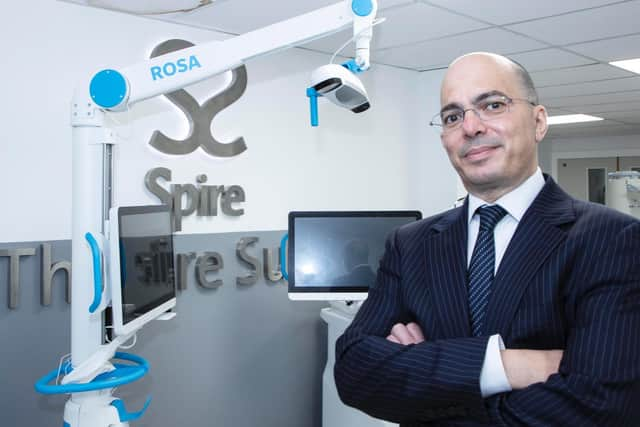Spire Leeds Hospital becomes one of first to offer robot-assisted surgery to patients
and live on Freeview channel 276
Designed to assist highly experienced knee surgeons, ROSA (which stands for Robotic Surgical Assistant) works by collecting data and X-rays before and during surgery which are used to generate a 3D imaging software model of the patient’s bone structure.
ROSA then conveys this unique information onto a screen for the surgeon enabling them to plan and perform precisely accurate and personalised surgery in real time based on the individual’s needs.
Advertisement
Hide AdAdvertisement
Hide AdROSA is being introduced into their practice at the Spire Leeds Hospital by Mr Mark Emerton and Mr Veysi Veysi who are members of the JointMotion Healthcare Group based in Leeds.


Spire Leeds Hospital is one of the first hospitals across the whole of Europe to offer the pioneering surgery.
“We are very excited about the significant benefits this new system offers both for our patients and our surgeons,” said Mr Veysi Veysi, consultant orthopaedic surgeon at Spire Leeds Hospital.
“Using the robot to assist in surgery will deliver a personalised approach to knee surgery leading to increased accuracy, better outcomes and decrease the rates of reoperation”.
Advertisement
Hide AdAdvertisement
Hide AdRobotic surgery is often viewed as an autonomous robot performing the procedure without human interaction.
However, this is not the case for ROSA.
Mr Veysi explained: “ROSA does not operate on its own, meaning it does not move unless the surgeon prompts it to.
"The surgeon is physically in control of the robot, making all the decisions based on specific information provided.
"This ensures the exact positioning of the new knee implant which varies for each individual.”
Advertisement
Hide AdAdvertisement
Hide AdMr Emerton and Mr Veysi have performed in excess of 2000 knee replacements each.
They said: “Another benefit of using ROSA is that it improves mobility for patients leading to a faster recovery time, so they become more active sooner compared to traditional knee replacements.
"It should also provide improved longevity before the implant needs replacing.
"Recovery time varies depending on the individual however patients should be able to return home in one to three days after surgery, drive and garden after three to four weeks and play golf after eight to ten weeks.
Advertisement
Hide AdAdvertisement
Hide Ad"Our aim is to restore mobility and get patients back to living life to its fullest as soon as possible.”
Support the YEP and become a subscriber today. Enjoy unlimited access to local news and the latest on Leeds United, With a digital subscription, you see fewer ads, enjoy faster load times, and get access to exclusive newsletters and content. Click here to subscribe.
Comment Guidelines
National World encourages reader discussion on our stories. User feedback, insights and back-and-forth exchanges add a rich layer of context to reporting. Please review our Community Guidelines before commenting.